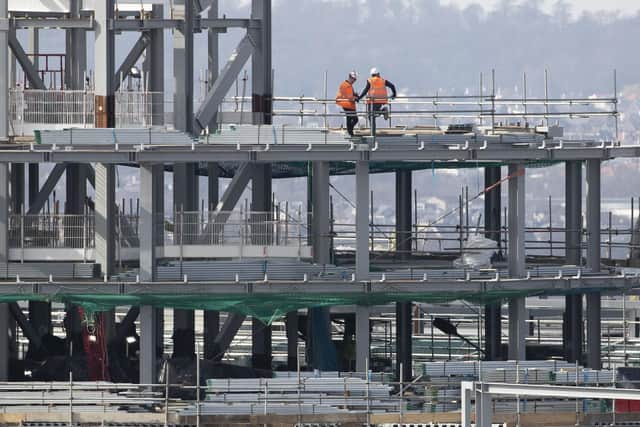Scottish construction sector will need additional 26,000 jobs by 2025 - new report
The industry is expected to grow by an annual average rate of 4.1 per cent, and recovering to pre-crisis growth levels by 2023, according to a new study from the Construction Industry Training Board (CITB).
The report pointed to major projects such as new onshore and offshore wind farms, the Edinburgh trams extension, a multi-billion-pound water investment programme, and new private housing schemes.
Advertisement
Hide AdAdvertisement
Hide AdIt noted that 26,250 additional jobs were required on top of the anticipated annual average workforce growth of 1.4 per cent per year until 2025, which includes turnover from new recruits and retirements.


Scotland’s construction workforce was estimated to be 226,100 at the end of 2020 and is set to increase to 241,800 by the end of 2025, according to the study.
However, the CITB warned that the commercial sector faced near-term risks due to a reduced demand for office use and also retail space as more shopping switches to online.
Ian Hughes, CITB engagement director for Scotland, said: “Scottish construction’s return to solid growth with new job opportunities shows the fortitude and adaptability of the sector through unprecedented times.
“CITB is supporting construction and working with the Scottish Government and further education providers to meet the skills needs ahead, particularly regarding the challenges of ‘net zero’, building safety and digital technologies.”
Most of the UK will experience an increase in construction output by 2025, the report added, with London and the West Midlands both at 4.8 per cent, the Yorkshire and the Humber region at 4.5 per cent, the south east of England at 4.4 per cent, and Wales at 4.1 per cent.
Meanwhile, permanent job registrations in the construction and property sector in Scotland have increased by some 59 per cent in the last 12 weeks, compared to the prior 12-week period, according to recruitment firm Hays Scotland.
Data from the firm also shows that temporary job registrations have increased by more than 42 per cent in the same period.
Advertisement
Hide AdAdvertisement
Hide AdClaire Sheerin, director of Hays construction and property in Scotland, said: “The construction industry in Scotland makes up 12 per cent of Scotland’s companies. The demand we’re seeing is in line with or, in many areas, ahead of pre-pandemic levels, leading to confidence about the future of this sector for 2021 and beyond.
“However, as a result, we’re witnessing skills shortages across a broad spectrum of construction jobs notably time-served joiners, quantity surveyors, electricians and skilled trades. Civil engineers and landscape architects are also in demand following the investment in civil infrastructure projects.”
Research from Hays shows that close to a quarter (22 per cent) of employers in Scotland say they do not have access to the right skills to enable them to meet organisational objectives.
Some 45 per cent of employers in Scotland said the biggest barrier to finding people with the right skills was a shortage of suitable applicants, followed by 43 per cent who cited competition from other employers.
A message from the Editor:
Thank you for reading this article. We’re more reliant on your support than ever as the shift in consumer habits brought about by coronavirus impacts our advertisers. If you haven’t already, please consider supporting our trusted, fact-checked journalism by taking out a digital subscription: www.scotsman.com/subscriptions
Comments
Want to join the conversation? Please or to comment on this article.
